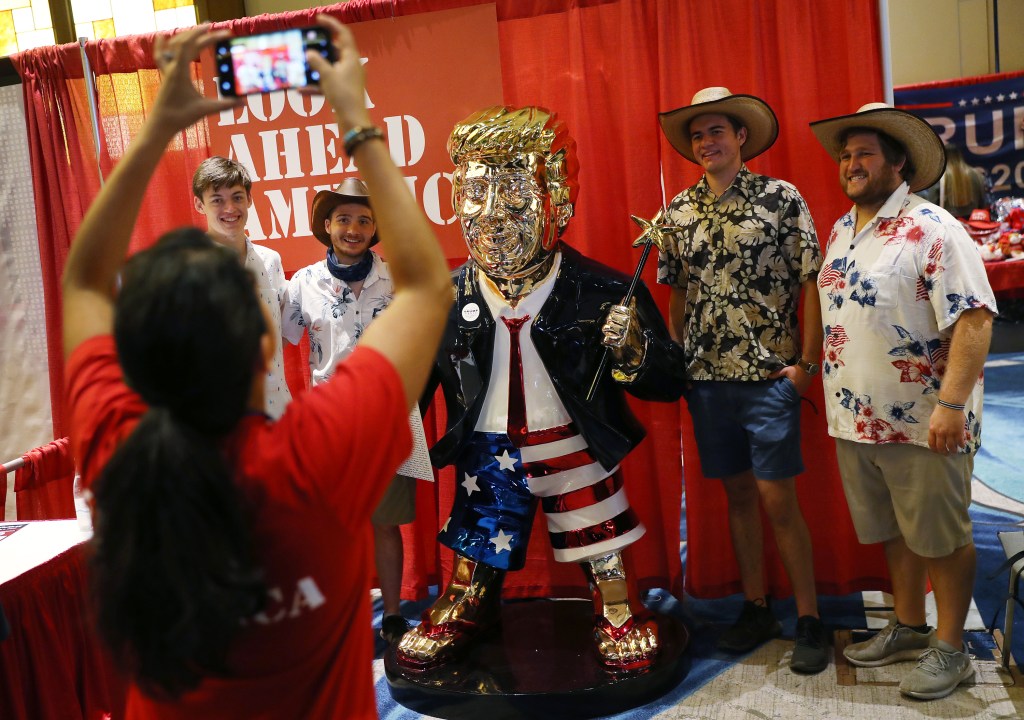In many places, posing with a golden idol of a politician would be weird. In Florida, it was just another Sunday—at least if that politician is the most famous Florida Man of them all, Donald Trump.
That’s not just because Florida is enthusiastically weird; like chilled-iguanas-falling-out-of-trees-and-conking-pedestrians-on-the-head kind of weird. It’s also because Florida is the emerging capital of Red America. Like Trump himself, the GOP seems to be migrating to the Sunshine State. Seven of the 10 largest states voted for Trump in 2016. Trump won four of the seven again in 2020, but only in Florida did he increase his margin of victory. The incumbent president was seriously droopy in Texas and North Carolina and stayed about the same in Ohio, but he shone in Florida. His victory by 3.3 points was the most decisive presidential win in the state since 2004.
The golden Trump statue, more Buddha than Baal, was certainly in the right place at Orlando’s convention center this weekend. The annual Conservative Political Action Conference was held in Florida this year because organizers didn’t want to comply with pandemic restrictions in metro Washington, D.C. But the quest for permissive gathering rules seems to have brought the event to its natural home. The annual gathering for mostly young Republicans has gone from a libertarian-leaning event where Ron Paul was a perennial straw poll winner to its new incarnation as a haven for the culture-warrior populist right where Trump is, ahem, idolized. This year’s theme: “America Uncanceled.” That sounds a lot more like Central Florida than the D.C. suburbs.
Whether Trump, who crushed this year’s CPAC straw poll, runs for president again or not, there’s a pretty decent chance that in 2024 Republicans will again nominate a Floridian. Gov. Ron DeSantis and Sens. Marco Rubio and Rick Scott are all in the mix and all have sought to emulate, to varying degrees, Trump’s new nationalism. Like Ohio, its longtime swing-state partner to the north, Florida has been getting more Republican in recent cycles. Meanwhile, Southern and Western states, most notably Texas, are moving away from the GOP.
Both Bushes, Ronald Reagan, and Richard Nixon could all have attested to the upsides of hailing from the biggest Republican state when it comes to winning the party’s nomination. If the current trends hold, Florida will soon be both bigger and more Republican than Texas, which two decades ago replaced California at the top of the heap. It’s not just about delegate math—though that’s certainly a factor—it’s also about party identity. Republicans once embraced the individualistic “leave us alone” ethic of Western conservatism as embodied by Reagan and Barry Goldwater. Now, Republicans celebrate a kind of cultural collectivism in which tribal loyalty is paramount. Trump is the perfect avatar for the new Florida-style GOP.
We talk a lot about how domestic migration is shaping the politics of traditional GOP states. And while it’s probably true that the influx of job-seeking Californians and Yankees have pushed places like Texas, Arizona, North Carolina, and Georgia to the left, the same hasn’t been true in Florida. So why would one fast-growing, low-tax state south of the Mason-Dixon line be getting more Republican while the others are getting more Democratic? It’s about who’s moving there and why.
In the previous decade, Florida’s population grew by more than 14 percent, about on par with Texas and Arizona. But while the other states keep getting younger on average, Florida maintains one of the oldest populations in the nation. Florida is the fifth-oldest state, behind Maine, New Hampshire, Vermont and West Virginia. Of the 10 states with a median age older than 40, only Florida and Delaware recorded significant population increases. Florida is getting a lot bigger, but it’s not getting any younger. Every year, tens of thousands of Americans from the Northeast—New York always leads the charge—and the Rust Belt move to Florida. Like the Californians who are messing with Texas, these snowbirds are bringing their politics with them.
It would stand to reason that as baby boomers grow increasingly Republican, so too would their top retirement destination. Neither can it be a surprise that these new Floridians would tend to embrace the kind of culture war, tough guy Republicanism that has long been part of the politics of the big cities of the industrial north. Think Frank Rizzo in wraparound shades, Buddy Cianaci in a guayabera and Rudy Giuliani as, well, himself.
For 50 years, the divisions in the Republican Party could substantially be described in geographic terms. The easterners were more moderate and the westerners were more conservative. The new divide in the GOP seems much less ideological and far more about the permissible means of obtaining and keeping power. Based on what we just saw in Orlando, the Sunshine State makes a strong case to be the geographic home for the total-war wing of the party.









Please note that we at The Dispatch hold ourselves, our work, and our commenters to a higher standard than other places on the internet. We welcome comments that foster genuine debate or discussion—including comments critical of us or our work—but responses that include ad hominem attacks on fellow Dispatch members or are intended to stoke fear and anger may be moderated.
You are currently using a limited time guest pass and do not have access to commenting. Consider subscribing to join the conversation.
With your membership, you only have the ability to comment on The Morning Dispatch articles. Consider upgrading to join the conversation everywhere.